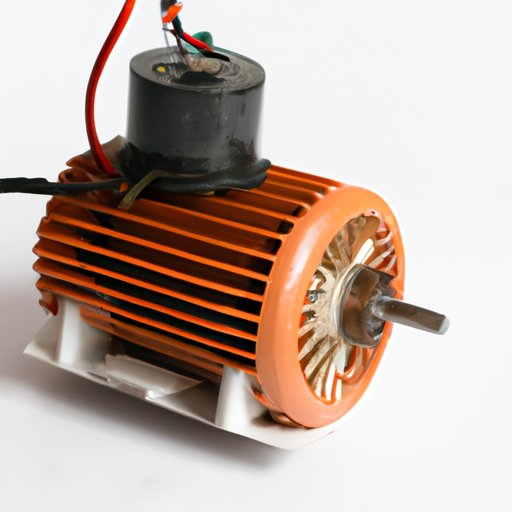Introduction
An AC motor is a type of electric motor that uses alternating current (AC) power to create mechanical motion. It is one of the most widely used motors in industrial applications due to its high efficiency and low cost. In this article, we will explore how an AC motor works, its advantages and disadvantages compared to other types of motors, and provide tips for troubleshooting common problems.

An Overview of How an AC Motor Works
An AC motor consists of several different components: a stator, rotor, and bearings. The stator is the stationary part of the motor and is made up of coils of wire wound around iron cores. These coils are connected to an external power source, which supplies alternating current to the stator. The rotor is the rotating part of the motor and consists of magnets or electromagnets. As the stator receives alternating current, it creates a rotating magnetic field that interacts with the rotor, causing it to spin.
In order to better understand how an AC motor works, it is important to have a basic understanding of the principles of electricity and magnetism. Alternating current is created by changing the direction of the flow of electrons. This causes the magnetic field generated by the stator to switch directions, which in turn causes the rotor to rotate.

Comparing AC Motors to Other Types of Motors
There are several different types of motors, each with their own advantages and disadvantages. AC motors are typically more efficient than other types of motors, such as DC motors, because they do not require brushes or commutators to generate the necessary current. Additionally, AC motors are usually cheaper and easier to maintain than other types of motors.
However, AC motors do have some drawbacks. For example, they are not as powerful as DC motors, and can be more susceptible to electrical interference. Additionally, AC motors require a more complex control system than other types of motors, which can add to the cost.
Examining the Benefits of AC Motors
Despite their drawbacks, AC motors offer a number of advantages that make them attractive for many applications. One of the main benefits of AC motors is their efficiency. Because there are no brushes or commutators, AC motors are able to convert more of the electrical energy into mechanical energy, resulting in higher efficiency levels. Additionally, AC motors tend to be less expensive than other types of motors, making them ideal for budget-conscious projects.
Another benefit of AC motors is their ease of maintenance. Because they do not contain any brushes or commutators, they require less maintenance than other types of motors. Additionally, AC motors are usually more reliable than other types of motors, making them a great choice for long-term applications.

Troubleshooting Common Problems with AC Motors
Like any other type of motor, AC motors can experience problems from time to time. Common issues include electrical problems, mechanical problems, and temperature issues. Electrical problems can be caused by faulty wiring or loose connections, while mechanical problems can be caused by worn out bearings or broken parts. Temperature issues can be caused by inadequate cooling or too much heat.
In order to troubleshoot these issues, it is important to identify the cause of the problem before attempting to fix it. If the issue is electrical, it may be necessary to check the wiring or connections for any signs of damage. If the issue is mechanical, it may be beneficial to inspect the bearings or other components to see if they need to be replaced. Lastly, if the issue is temperature-related, it may be necessary to ensure that the motor is getting adequate cooling.
Conclusion
An AC motor is a type of electric motor that uses alternating current to generate mechanical motion. It is an efficient, cost-effective, and easy to maintain motor that is widely used in industrial applications. In this article, we explored how an AC motor works, its advantages and disadvantages compared to other types of motors, and provided tips for troubleshooting common problems.
Overall, AC motors provide many benefits and are a great choice for many applications. By understanding how they work and being aware of potential problems, you can ensure that your AC motor operates efficiently and reliably.
(Note: Is this article not meeting your expectations? Do you have knowledge or insights to share? Unlock new opportunities and expand your reach by joining our authors team. Click Registration to join us and share your expertise with our readers.)
